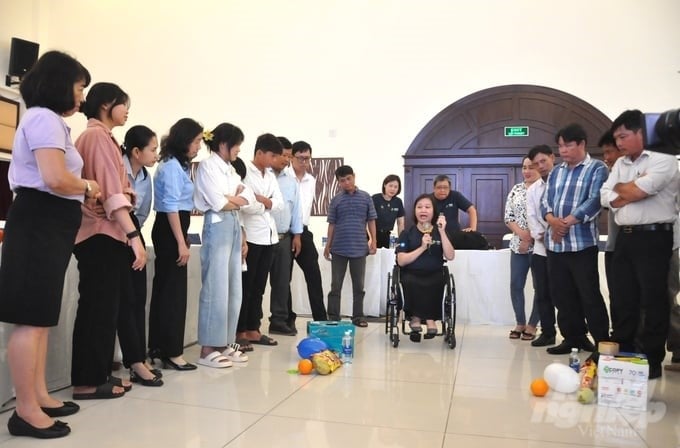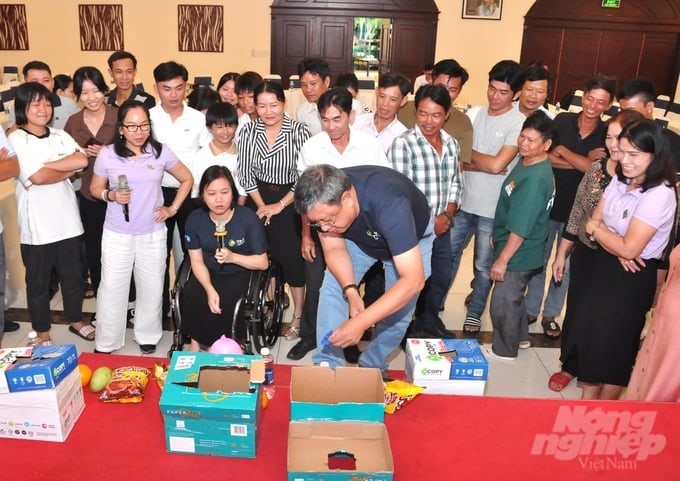June 21, 2025 | 14:19 GMT +7
June 21, 2025 | 14:19 GMT +7
Hotline: 0913.378.918
June 21, 2025 | 14:19 GMT +7
Hotline: 0913.378.918
On July 15, in Rach Gia city (Kien Giang), the Department of Crop Production (Ministry of Agriculture and Rural Development), in collaboration with the Netherlands Development Organization (SNV), organized training to improve capacity to practice gender equality and social justice under the goal of green growth in implementing the 1 million hectares of high-quality rice project in the Mekong Delta.

The training is organized in the form of team games, so it is quite interesting and easy to understand, attracting a large number of students to participate. Photo: Trung Chanh.
Attending the training class were leaders of the Department of Agriculture and Rural Development, the Department of Crop Production and Plant Protection, community agricultural extension officers, the Office for People with Disabilities under the Department of Labor, War Invalids and Social Affairs, the Provincial Women's Union, leaders of districts and communes with cooperatives building models, and members of cooperatives participating in the 1 million hectares of high-quality rice project.
This is the first training class in 7 locations to implement the pilot model of the Sustainable Development Project of One Million Hectares Specializing in High-Quality and Low-Emission Rice Cultivation Associated with Green Growth in the Mekong Delta until 2030 (referred to as the 1 million hectares of high-quality rice project).
During one day, trainees were trained and shared by experts to understand disability and disability integration, barriers for people with disabilities, and methods to overcome barriers and integrate disability integration in the activities of the 1 million hectares of high-quality rice project.
Trainees were also trained in basic knowledge about gender and gender equality, gender issues in rice production and business, and gender integration in activities of the project of 1 million hectares of high-quality, low-emission rice associated with green growth in the Mekong Delta. The training is organized in the form of team games, so it is quite interesting and easy to understand.
Vietnam is aiming to build a more sustainable and competitive agriculture. But economic transformation also affects women as well as many different ethnic groups. Women have limited access to land ownership to access credit and secure their livelihoods. Women and ethnic minority groups are often involved in labor-intensive, lower-value activities in the agricultural value chain.

Trainees participate in training. Photo: Trung Chanh.
On small farms in the Mekong Delta, women participate in household decisions about input purchases and selling prices for products such as rice and vegetables. However, women's control over decision-making decreases as agricultural businesses grow. Therefore, women often participate less in large production investment activities. Women have limited access to resources to be able to take advantage of business development opportunities in growing agricultural fields.
Mr. Le Huu Toan, Director of Kien Giang Department of Agriculture and Rural Development, said that implementing the project of 1 million hectares of high-quality, low-emission rice associated with green growth in the Mekong Delta, Kien Giang province registered a production area of 200,000 hectares. . Kien Giang implemented the project's pilot models at Phu Hoa Youth Services Cooperative (Tan Hiep district) and Thanh An Shrimp-Crab-Rice Cooperative (An Minh district). These are two specific rice production areas of Kien Giang province, including the rice-shrimp area in U Minh Thuong districts and the area specializing in rice cultivation with 2-3 crops/year in Tan Hiep district.
Translated by Thu Huyen
![Turning wind and rain into action: [9] Digitizing hydrometeorological data in response to climate change](https://t.ex-cdn.com/nongnghiepmoitruong.vn/608w/files/news/2025/06/17/z6704423696987_15fd32ffc26d590d204d520c9dac6786-nongnghiep-165943.jpg)
(VAN) Farmers have begun accessing hydrometeorological applications to adjust their cropping schedules, aiming to ensure productivity and adapt to climate change.
![Turning wind and rain into action: [8] Real-time salinity detection and early warning technology](https://t.ex-cdn.com/nongnghiepmoitruong.vn/608w/files/news/2025/06/17/z6704423696987_15fd32ffc26d590d204d520c9dac6786-nongnghiep-151127.jpg)
(VAN) Thanks to the integration of modern hydrological-hydraulic models, remote sensing technologies, and artificial intelligence, the accuracy of hydrological forecasting has significantly improved.
![Turning wind and rain into action: [7] Early disaster warnings help marine farmers minimize losses](https://t.ex-cdn.com/nongnghiepmoitruong.vn/608w/files/news/2025/06/17/z6704423696987_15fd32ffc26d590d204d520c9dac6786-nongnghiep-142942.jpg)
(VAN) In recent years, thanks to early disaster warnings and forecasting, marine farmers in Khanh Hoa province have been able to reduce risks and losses, thereby improving production efficiency.
![Turning wind and rain into action: [6] ‘Four on-the-spot’ disaster management software](https://t.ex-cdn.com/nongnghiepmoitruong.vn/608w/files/news/2025/06/17/e5a48259d6a262fc3bb3-nongnghiep-183800.jpg)
(VAN) By simply activating the scenario on the disaster management software, the relevant authorities immediately know how many households need to be evacuated, where to evacuate them to, and by what means of transportation…
![Turning wind and rain into action: [5] Hue applies modern technology in disaster forecasting](https://t.ex-cdn.com/nongnghiepmoitruong.vn/608w/files/news/2025/06/17/z6704423696987_15fd32ffc26d590d204d520c9dac6786-nongnghiep-093938.jpg)
(VAN) In Hue city, modern technology has recently been applied in meteorological and hydrological forecasting and warning, helping to reduce the damage caused by natural disasters.

(VAN) A cutting-edge farming technique being implemented on an experimental ranch in Arizona's Sonoran Desert has already saved a billion gallons of water over five years, according to Civil Eats.

(VAN) Poultry and pig production and the environment can be boosted through enhanced water technology, according to new research.